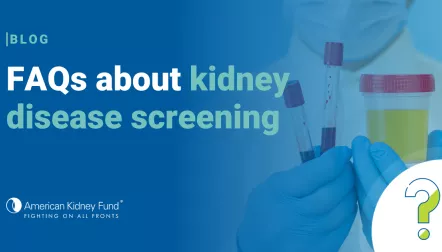
Blog post
Donor derived cell-free DNA: A new kidney transplant monitoring method
When you are living with a kidney transplant, it is important for your doctor to consistently monitor how well your new kidney is functioning to ensure that you have the best health outcomes.
What are the current limitations to post-transplant kidney monitoring?
Currently, the main way nephrologists like me monitor your new kidney is by measuring your serum creatinine through a blood draw. Monitoring helps us know if your kidney function is stable and alerts us if there are problems. Although easy and inexpensive, creatinine is not a very sensitive marker for identifying early kidney injury. You may have significant injury to your transplanted kidney before your creatinine is elevated, and treatments may not be as effective. Ideally, there would be a better way to monitor your kidney closely to catch problems earlier.
The gold standard for diagnosing problems with your transplant is through a kidney biopsy. During the biopsy procedure, we insert a small needle into your kidney and take out a small sample for examination under a microscope. The biopsy is very informative, but it's an invasive procedure that comes with a small risk of bleeding after the procedure. Because of this, the biopsy is not ideal for ongoing kidney monitoring. Ideally, what we would like is a non-invasive but highly informative test to let us know if there are problems happening with your transplant as early as possible. There are some new tests on the market that can help address biopsy limitations.
What are these new tests for kidney monitoring and how do they work?
The new kidney monitoring tests use a simple blood draw and take advantage of the fact that most cells in your body contain DNA. DNA contains the information that helps define you as uniquely you. Your transplanted kidney also has DNA in its cells from your donor. When there is damage to your transplant, like rejection, cells are injured and DNA from the kidney is released into your blood. This DNA that now circulates through your body is called cell-free DNA (cfDNA). There are new blood tests that can tell the difference between your DNA and your kidney donor's DNA (donor derived or dd-cfDNA). If there is more dd-cfDNA circulating than normal, this is an indication that you may have a kidney injury, including rejection. These tests are more accurate than just checking serum creatinine, and because these tests only require a blood draw, they allow your transplant center to monitor you very closely.
How are the tests used?
These tests are used in two ways, for surveillance and to help decide if you do need a kidney biopsy.
For surveillance, when you feel well and your creatinine is doing well, these tests can reassure you that there is no subtle, unrecognized damage or rejection going on with your transplant. In addition, if your creatinine is normal but your dd-cfDNA is elevated, this may be an early warning sign for your transplant doctor that they need to do more investigation, sometimes including a kidney biopsy, to catch problems early and allow for the best treatment before there is a lot of kidney damage.
These tests may also help avoid unnecessary kidney biopsies. Typically, if your creatinine is elevated for unclear reasons, you may be asked to have a kidney biopsy to exclude the possibility of rejection, infection or other acute damage to your transplant. But now, if you have elevated creatinine but a normal amount of circulating dd-cfDNA, your transplant provider can feel comfortable that most of the time this means there is no damage to your transplant and they may watch you closely, rather than perform an invasive biopsy.
Are the tests accurate?
Yes. A normal test almost all the time means there is no rejection happening in your kidney. An abnormal result means there is a good chance you are experiencing rejection. Because these tests are simple blood draws, many transplant doctors use them every 1-3 months per year for the first few years after your surgery to know how your new kidney is performing. These tests also give your transplant center a good way to monitor your kidney long term.
The dd-cfDNA tests are a significant improvement to the kidney monitoring tools we had before. They can help you get as many years as possible out of your transplant.
Are these tests covered by insurance?
The tests are covered by Medicare and many private insurance companies and may be a great complement to your overall transplant care. If you are facing any out-of-pocket expenses related to these types of tests, the American Kidney Fund (AKF) may be able to help with our Post-Transplant Testing Program.
What is AKF's Post-Transplant Testing Program?
AKF's post-transplant testing program can assist you with a one-time grant of up to $1,200 for out-of-pocket expenses, like co-pays and deductibles. Financially eligible transplant recipients can apply through AKF's Grants Management System (GMS). For questions, either send us a message through GMS or email registration@kidneyfund.org.





